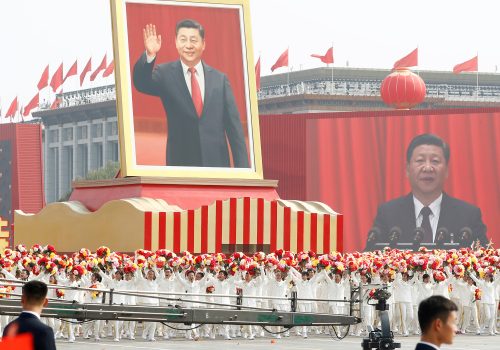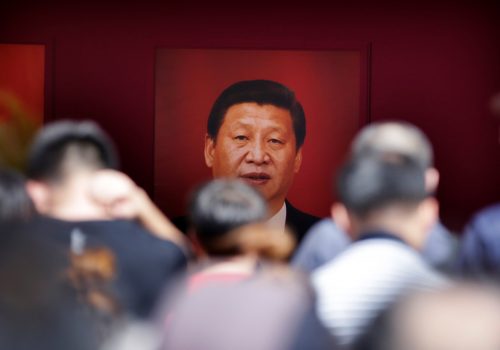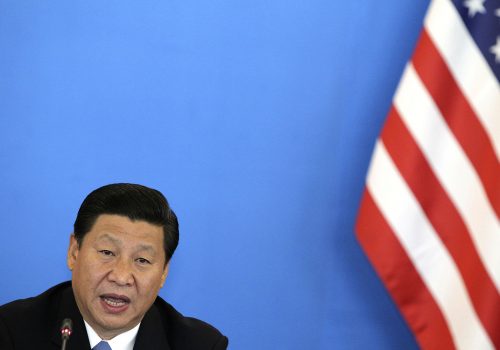The world reacts to ‘The Longer Telegram’
On January 28, the Atlantic Council published “The Longer Telegram: Toward a new American China strategy.” Authored by an anonymous former senior government official and modeled on former American diplomat George Kennan’s famous “Long Telegram” at the dawn of the Cold War, the paper dissects internal Chinese political dynamics and outlines a comprehensive strategy for addressing the singular challenge China now poses to the United States and the democratic world.
In the days since its publication, “The Longer Telegram” has sparked a spirited debate everywhere from India and Pakistan to Britain and Singapore. It’s a global conversation—an exchange of big ideas and bold strategy proposals—that we welcome, as an institution with a proud tradition of fostering debate on the most pressing issues in international affairs. Today, no issue is more pressing than the question of what the United States and its allies should do about China.
In China itself, the paper has elicited sharp criticism from the Foreign Ministry and a slew of pieces in the state-run Global Times.
Back in Washington, DC, Dan Sullivan, an Alaska senator and member of the Armed Services Committee, had a much more positive reaction. In a speech on the Senate floor, he urged his colleagues to read the paper, arguing that the United States has arrived at a historic moment in which it urgently needs to develop a bipartisan strategy toward a rising China:
As we have in the past, Americans can prevail in this long-term geopolitical and ideological contest. But doing so will require a new level of strategic initiative, organization, and confidence in who we are and what we stand for. And this also means we must redouble our efforts in making the strategic case not just to Americans, but to others around the world, particularly our allies…
‘The Longer Telegram,’ while not perfect, sets out what I believe is certainly one of the best strategies I have read to date about how the United States needs to address this significant challenge that we will be facing for decades. I hope my colleagues, Democrats and Republicans, all have the opportunity to read this, analyze it. For like Kennan’s strategy of containment, our China policy, to be successful, also needs to be very bipartisan and ready to be operationalized for decades.
In an article for The Hill, Dov Zakheim, a senior adviser at the Center for Strategic and International Studies, member of the Atlantic Council’s Board of Directors, and former senior US defense official, noted that “Washington and many capitals around the world are abuzz” about “The Longer Telegram.” And whatever the paper’s shortcomings, that’s a good thing, he argued:
The Longer Telegram has spurred an important debate—both regarding how to ensure that a China strategy, about which there is a growing American and allied consensus, can be sustained over the next several decades and, equally important, how it should be implemented.
Hopefully, President Biden’s senior policymakers not only will take notice, but will amplify, sharpen and act upon many of its recommendations.
Calling “The Longer Telegram” a “brilliant essay,” Juliet Samuel, a columnist for The Telegraph, argued that while “Donald Trump woke up Washington to the threat” posed by China, he was unable “to devise a strategy, forge bipartisan support, and recruit allies”—deficiencies the United States must now lead an effort to address.
Others have offered substantive critiques of the paper. Several commentators, for example, challenged the author’s analysis of China’s internal politics and its ambitions.
Paul Heer, a former US national intelligence officer for East Asia, argued in The National Interest that the report neither accurately diagnoses the problems presented by China nor proposes a realistic strategy. For example, Heer wrote that the report commits a “fundamental error” in its analysis of Chinese leader Xi Jinping, including its claims that Xi is primarily responsible for the threat that China now poses to the United States and that the Chinese leader is returning to “an older form of Marxist-Leninist orthodoxy.” He continued:
Every one of these assertions is inaccurate. Virtually all of the current strategic drivers of U.S.-China tensions already existed under Xi’s predecessors and imposed limits on Beijing’s readiness ‘to work with the United States.’ Xi is not seeking any more than his predecessors did to remake the international order in China’s image. Under his predecessors, China was already an avowedly Leninist party with a profoundly Marxist worldview, and this was never forgotten.
On Twitter, Eric Hundman, an assistant professor at NYU Shanghai, questioned the idea that there is enough resistance within the Chinese Communist Party (CCP) “to offer leverage for US strategists,” and expressed doubts about the author’s characterization of China as a revisionist power.
To be fair, many would agree w/ the claim that "Xi has demonstrated that he intends to project China’s authoritarian system, coercive foreign policy, and military…well beyond his country’s own borders." But several empirical studies have found that China tends status quo: 5/x
— Eric Hundman | 何諳銳 (@ehundman) January 29, 2021
Rorry Daniels, an Asia security specialist at the National Committee on American Foreign Policy, similarly raised questions on Twitter about the paper’s emphasis on Xi as the primary driver of China’s assertive approach to global affairs:
Serious question for China scholars: do you agree that Xi Jinping is the catalyst for China’s more aggressive policies or is he shaped by the Party’s needs and incentives? Put another way, would a different person govern differently? 3/
— Rorry Daniels (@rorrydaniels) January 28, 2021
In a similar vein, Zakheim wrote, “There is no reason to expect any change in CCP behavior once Xi departs from the scene.” He cited the example of the Soviet Union, pointing out that after Joseph Stalin died there was only a temporary “thaw” within the Soviet Union’s power structures.
In Hong Kong, Wang Xiangwei, the former editor-in-chief of the South China Morning Post, wrote in the paper that “the biggest problem with The Longer Telegram is that it overstates China’s ambitions, reflecting the prevalent view of the China hawks.” While acknowledging that China under Xi is “trying to maximise its economic power and influence to advance its goals on the global stage,” Wang contended that China is less ambitious than the author implies:
The Chinese leadership well understands that it is almost impossible for Beijing to export its own governance model to other countries, not least because it considers its political model of combining the Communist Party’s authoritarian controls with free-market principles as a unique feature of Chinese exceptionalism.
Other critiques focused more on the strategy proposed by the author. Writing in The American Conservative, Daniel Larison saw a “critical flaw” in the strategy:
[The author] imagines that there is some way that the U.S. can successfully change the decision-making of top Chinese officials when our government’s record of compelling foreign leaders to change their behavior is very poor. The U.S. has tried and failed to force changes in regime behavior in much smaller, weaker countries than China. The idea that the U.S. has the ability to force such changes in the Chinese government’s behavior is sheer fantasy.
Pointing to a separate potential structural flaw in the strategy, Daniels observed that the main argument of the paper seems to be that “if China can’t meet expectations because of US pressure (using US power to shape China’s behavior and objectives), then Xi Jinping will face internal challenge to his rule.” Challenging this point, she wrote that nationalism is not always rational and that the United States could become a “bogeyman” that helps Xi maintain his hold on power.
Taking a different approach, Martin Wolf, the chief economics commentator at the Financial Times in London, raised doubts about whether the objectives set forth in the strategy can be achieved, citing China’s strength and America’s weakened position in the world. He observed that China is a stronger adversary than the Soviet Union was, with a much better-performing economy. He also maintained that the United States must wrestle with a diminished global reputation:
Finally, over the last two decades and especially the last four years, the US has devastated its reputation for good sense, decency, reliability and even adherence to basic democratic norms. This matters, because its allies will be crucial in the envisaged contest… The US used to talk about the need for China to be a ‘responsible stakeholder.’ But after the hubris of the ‘unipolar moment,’ the Iraq war, the financial crisis and Donald Trump’s presidency, is the US a responsible stakeholder?
Some critiques of the strategy homed in on specific elements of the paper. Former US Ambassador to Russia Michael McFaul tweeted that the author’s suggestions for peeling Russia away from China is “analytically naive.”
That will never happen as long as Putin rules Russia. (And how to ally with a dictator & promote liberal values at same time?) And even if it could happen, pulling Russia into our orbit would not yield any great containment gains. 4/
— Michael McFaul (@McFaul) January 28, 2021
Edward Wong, diplomatic correspondent at The New York Times, tweeted that “some parts [of ‘The Longer Telegram’] are notable and a departure from consensus opinion in DC, even if there’s much that US officials will agree with.” Wong highlighted the author’s call for clear, enforceable “red lines” as “striking” in that “many US officials & analysts denounce China for its military expansionism & actions in the region, [but] there’s no agreement on whether US should draw clear red lines on this.” He also observed that the “greatest departure from mainstream DC thinking is on Russia,” arguing that this makes the author more akin to former US secretary of state and national security advisor Henry Kissinger:
6. The writer is more Kissinger than Kennan in advising the US to woo Russia. They want a mirror image of Nixon's opening with China, which was done to get China's help in countering the USSR. They say the US must break the recent "strategic condominium" between China and Russia. pic.twitter.com/Xgh6Y7wAkH
— Edward Wong (@ewong) January 29, 2021
The Print, an Indian digital newspaper, spotlighted several parts of the paper that will interest India, including a “fully operationalized Quadrilateral Security Dialogue (Quad) with India, Japan, and Australia.” Other aspects of the paper may also intrigue Indian officials:
Two other points from the paper that will interest India is its suggestion to stop China’s expansionism not just among treaty allies, and that the US must not stop immigration. The paper also hints that India will have to step in to convince the United States that it cannot be at odds with both China and Russia simultaneously.
Noting the proliferation of China strategies in Washington, Axios’s Bethany Allen-Ebrahimian compared “The Longer Telegram” with a State Department paper released in November that analyzed the China challenge. While noting that these papers “identified similar problems,” she wrote that “The Longer Telegram” had “a more optimistic view of the Chinese Communist Party, suggesting the U.S. had the ability, through carefully calibrated policy, to roll back the clock on the CCP’s totalitarian transformation under Xi.” She concluded with this bottom line:
There is now broad consensus China can and will shape the U.S.-led international system in its more illiberal image, unless democracies act in concert to prevent this. But so far, we’ve only just begun to discuss what to do about it.
Further reading
Image: Chinese and U.S. flags flutter outside the building of an American company in Beijing, China, January 21, 2021. REUTERS/Tingshu Wang


